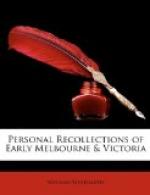UNITY OF THE EMPIRE.
This question has been in a course of rapid clearing during the last few years, and the successful establishment of the Imperial Federation League has given an orderly procedure in every way promising. The object aimed at is, that the empire shall have that political binding which will give to it the maximum of power and influence possible under all its circumstances. Above fifteen years ago some few of us—very few they then were—first seriously raised this question at Home in the Royal Colonial Institute. We had the smallest of audiences then. It is marvellous to look back now upon that indifference. I recollect that about ten years ago, when the movement was just beginning to look serious to those outside of us, a leading Paris paper devoted an article to the subject, remarking that if Great Britain persevered so as to unite her empire as sought, the balance of the world’s power would be so seriously disturbed as to call for an international reconsideration of that subject.
The progress as yet has been chiefly negative, but it has been great. Modes entertained at first have been discarded. This may be said of superseding the present Imperial Parliament by a pro re nata Federal Assembly; and it may be equally said of an influx of proportionate colonial representatives into the Home House. Councils of colonial ambassadors, agents-general, and so on, have, I think, definitely gone the same way. These are chiefly Home views, for Home is at length aroused as well as the colonies to their common question; and the summons by the Secretary for the Colonies of the Colonial Conference which sat in London two years ago marks alike the most prominent and most promising feature in the movement.




